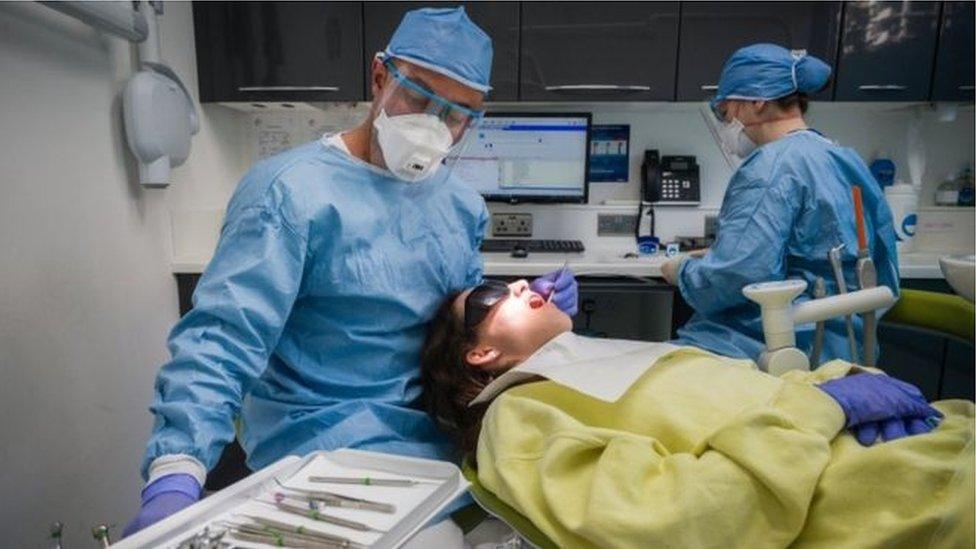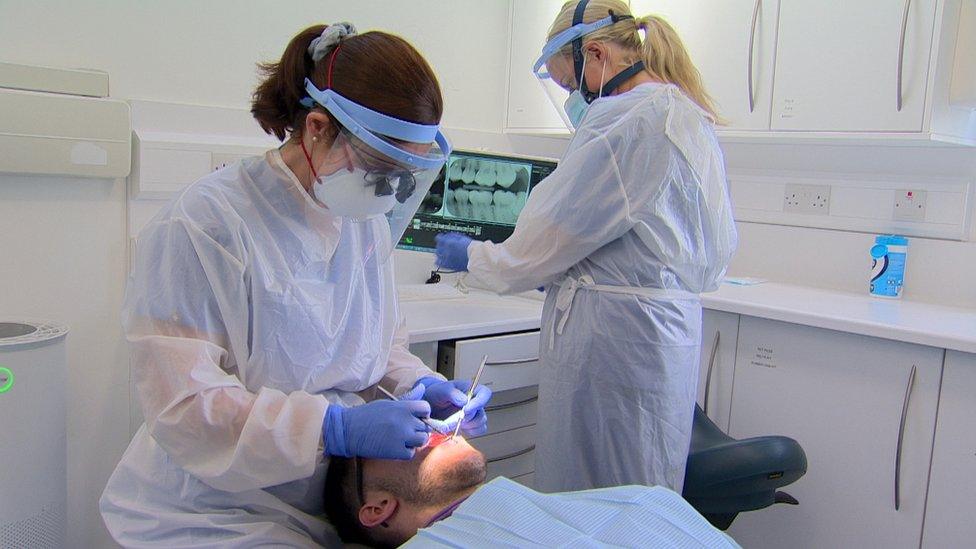NHS dental practices 'may struggle to remain financially viable'
- Published

Health service-committed practices are "overstretched and underfunded", the BDA says
Northern Ireland dental practices that provide NHS services may "struggle to remain financially viable", the British Dental Association (BDA) has said.
The body has warned they are becoming "increasingly reliant" on private work to maintain health service dentistry within their practices.
The BDA has launched its manifesto ahead of the assembly elections in May.
It said that fees provided for NHS care have fallen by "as much as a quarter in real terms" in the last 10 years.
The chair of the BDA's Northern Ireland Council, Roz McMullan, said an "ambitious oral health strategy" is needed.
"Northern Ireland's dentists are working to a financial model that no longer adds up," she said.
The Department of Health said the uplift in fee levels each year is informed by the recommendations from the UK wide Review Body on Doctors' and Dentists' Remuneration (DDRB) and that its recommendations have been implemented in full since 2016/17.
On Monday evening, the BDA said it was "gutted" at the outcome of talks with the Department of Health and the Health and Social Care Board (HSCB).
It described new funding arrangements announced for general dental services as "totally inadequate".
The body hoped for a bigger increase in fees to help practices facing financial pressures but said a proposed 25% enhancement to dental fees left NHS dentists "worried for the future".
'Prioritise dental reform'
Earlier, Ms McMullan said dentists were "overstretched and underfunded"
"Health service-committed practices are struggling to remain financially viable," she added.
"Colleagues feel they are being pushed out of NHS dentistry - at the very time we face a huge Covid backlog.
"We all need to know this service has a future, because otherwise the UK's deepest oral health inequalities will only widen."
Ms McMullan said the association was calling on politicians to ensure that NHS dentistry is a priority in the next mandate.
In an interview with BBC News NI's Good Morning Ulster on Monday, she warned that there was "a real possibility" that access to NHS dentistry for all is at risk.
Ms McMullan said the fees paid to dentists for NHS work had gone down by 40% in real terms since 2009.
"It got to the point where the more NHS work a practice did, the less was the income," she said.
But Ms McMullan said dentists wanted to remain positive.
Dental disease often affects those less advantaged in society, she said.
"We are passionate that they can retain access to a preventative-based dental treatment.
"We have to look at a new way of delivering dentistry that all people can access at the time they need it for NHS dentistry."
In a statement, the department said dentists were "not sheltered from fluctuations in operating costs and given the current rate of inflation those costs have increased".
"It is expected that this will be taken into account in the next publication of the DDRB report due in June 2022, the recommendations of which will be given full consideration," it continued.
"In December 2021 the minister established the General Dental Services Contract Reform group to develop of options for a new contract for General Dental Services.
"One of the primary objectives of any new contract is that, when considered in isolation to private care, it is financially viable and attractive to providers."
The British Dental Association has also called for investment in increased places at the School of Dentistry at Queen's University.
Last year, the number of allocated undergraduate places in Northern Ireland remained fixed at 60, according to figures from the Office for Students.
There was a 10% increase in the number of allocated undergraduate places in England in the same period.
Related topics
- Published25 September 2021

- Published20 July 2021
